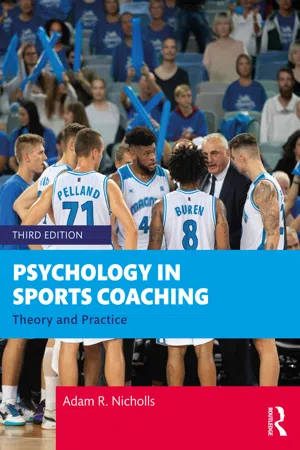
- 314 pages
- English
- ePUB (mobile friendly)
- Available on iOS & Android
About this book
The most effective coaches understand the fundamentals of sport psychology, which include interacting effectively with athletes, creating the optimal environment, assessing the psychological needs of their athletes, and providing them with the mental training required to maximise performance.
Fully revised and updated, the third edition of Psychology in Sports Coaching clearly and accessibly introduces the principles and practice of sport psychology in the context of the coaching process. Drawing on the very latest research and theory, the book introduces the psychological tools and techniques that coaches can use to get the best performances out of their athletes. Including three new chapters on the constraints approach to assessing psychological needs, mental imagery, managing perfectionism tendencies, and mentoring leaders, the book also offers step-by-step guidance on key topics such as:
- Assessing the needs of athletes
- Facilitating awareness through goal setting and performance profiling
- Coaching specialist populations effectively (e.g. children, adolescents, adults and athletes with learning disabilities)
- Reducing favourable attitudes towards doping
- Developing effective coach-athlete relationships
- Reducing choking under pressure
- Mindfulness techniques
- Mental imagery
Every chapter contains useful features to aid learning and understanding, including in-depth case studies, critical thinking questions, clear and concise summaries, and practice exam questions. Psychology in Sports Coaching is essential reading for any student of sports coaching, or any practising coach looking to extend and develop their skills, and useful applied reading for students of sport psychology.
Frequently asked questions
- Essential is ideal for learners and professionals who enjoy exploring a wide range of subjects. Access the Essential Library with 800,000+ trusted titles and best-sellers across business, personal growth, and the humanities. Includes unlimited reading time and Standard Read Aloud voice.
- Complete: Perfect for advanced learners and researchers needing full, unrestricted access. Unlock 1.4M+ books across hundreds of subjects, including academic and specialized titles. The Complete Plan also includes advanced features like Premium Read Aloud and Research Assistant.
Please note we cannot support devices running on iOS 13 and Android 7 or earlier. Learn more about using the app.
Information
PART 1
Providing psychological training as a coach and mental health among athletes
1
DO’S AND DON’TS FOR COACHES WHO PROVIDE SPORT PSYCHOLOGY TO THEIR ATHLETES
Ethics, referrals, and the HCPC
- What sport psychology is and what it isn’t
- Ethical issues associated with providing sport psychology to athletes: some don’ts and do’s
- The regulation of sport psychologists and protected terms
- Referrals
- Practical implications of coaches providing sport psychology
What sport psychology is and what it isn’t
Ethical issues associated with providing sport psychology to athletes: some don’ts and do’s
Don’ts
- Provide psychological help for non-performance issues (e.g. depression, drug abuse, alcohol addiction, gambling, eating disorders, or relationships). In instances that these cases are presented to the coach, the athlete should be referred immediately to a clinical psychologist or a general practitioner (Andersen and Van Raalte, 2005).
- Put pressure on an athlete to receive psychological help.
- Let the psychological help provided to an athlete reduce the quality of coaching provided.
Do’s
- Consult a registered sport and exercise psychologist or clinical psychologist if there are any doubts regarding the aspects of the psychological help he or she provides or concerns he or she may have with an athlete.
- Provide athletes with information on the different psychological skills that can be taught by a coach and the commitment the athlete will have to make before starting any psychology training interventions.
The regulation of sport psychologists and protected terms
- An undergraduate degree that is accredited by the British Psychological Society (BPS).
- A master’s degree, which is accredited by the BPS, in sport and exercise psychology.
- Two years of supervision by an HCPC-registered sport and exercise psychologist.
- or the Sport and Exercise Psychology Accreditation Route through BASES.
- Achieving an undergraduate degree that is accredited by the relevant country’s psychological society (e.g. American Psychological Association, Canadian Psychological Association, or Australian Psychological Society).
- A professional doctorate in psychology.
Referrals
- Depression
- Drug abuse
- Alcohol addiction
- Gambling
- Eating disorders
- Relationships
Practical implications of coaches providing sport psychology
2
MENTAL HEALTH DISORDERS AND SYMPTOMS AMONG ATHLETES
- Definition of mental health disorders and symptoms
- Specific mental health symptoms among athletes
- Prevalence of mental health disorders among athletes
- Role of the coach
- Creating an environment that supports mental well-being
Definition of mental health disorders and symptoms
Specific mental health symptoms among athletes
Sleep disorders or sleep concerns
Table of contents
- Cover
- Half Title
- Title Page
- Copyright Page
- Dedication Page
- Contents
- List of figures
- List of tables
- Introduction
- Part 1 Providing psychological training as a coach and mental health among athletes
- Part 2 Identifying the psychological needs of athletes
- Part 3 Facilitating awareness among athletes
- Part 4 Coaching different populations and providing psychological support to athletes with different needs
- Part 5 Relationships, support, and influence within coaching practice
- Part 6 Mental skills training for athletes
- References
- Index